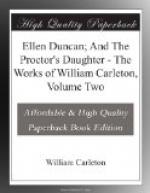Duncan was arraigned: and on being asked the usual question of “guilty, or not guilty?” he answered in a clear, calm voice, “Not guilty, my Lord!” and the trial proceeded. The same evidence that was given at the magistrate’s house was a second time repeated; and, evidently, its train of circumstances made a deep impression on the court. While the first part of the examination was going forward, Ellen remained as motionless as a statue, scarcely daring to move or breathe; but when the depositions went more and more against Owen, her respirations became quick, short, and gaspish; and when the crier desired her to get up on the table, it was with difficulty that she obeyed him. When seated, she gazed timidly round on the crowd of counsellors and the judges, as though to bespeak their sympathy; but then, not meeting a single glance from which to glean even the shadow of hope, she covered her face with her hands. A moment or two elapsed, and she grew more assured, and the counsel for the Crown proceeded with the examination.
“Ellen Duncan, is not that your name?” was the first question.
“It is, Sir,” she shrinkingly answered, without raising her eyes.
“Do you know the prisoner at the bar?”
“Do I know the pres’ner at the bar?” she reiterated; “do I know Owen Duncan? Shure, isn’t he my husband?”
“Do you recollect the night of the twenty-first of September?”
“I do, Sir.”
“Can you swear to whether your husband was at home on that night or not?”
Her voice faltered a little as she answered in the negative; and on the presiding judge repeating the question, with the addition of, “Did he return at all next day?” it seemed as if she first thought that her answers might criminate him still farther, and clasping her I hands convulsively together, and raising her face to the bench, while the scalding tears chased each other down her sunken cheek, she passionately exclaimed—
“Oh, for the love of heaven, don’t ask me any thing that ’ill be worse for him! Don’t, counsellor jewel, don’t! don’t ask me to swear any thing that ‘ill do him harm; for I can’t know what I’m sayin’ now, as the heart within me is growin’ wake.”
After a few cheering expressions from the bench, who evidently were much moved by her simply energetic language and action, she was asked whether she could tell the Court where her husband spent that and the following nights; and with all the eagerness that an instantaneously formed idea of serving him could give, she answered—
“Oh, yis! yis! my Lord, I can. He was in the mountains shootin’ wid Phil Doran’s gun, an’ he was sazed by some men, that made him stop wid thim, an’ take an oath not to revale who they wor, an’ they thrated him badly; so afther three days he made his escape, and come home to the cabin, whin he was taken by the poliss.”
“One word more, an’ you may go down—What was done with that gun?”




